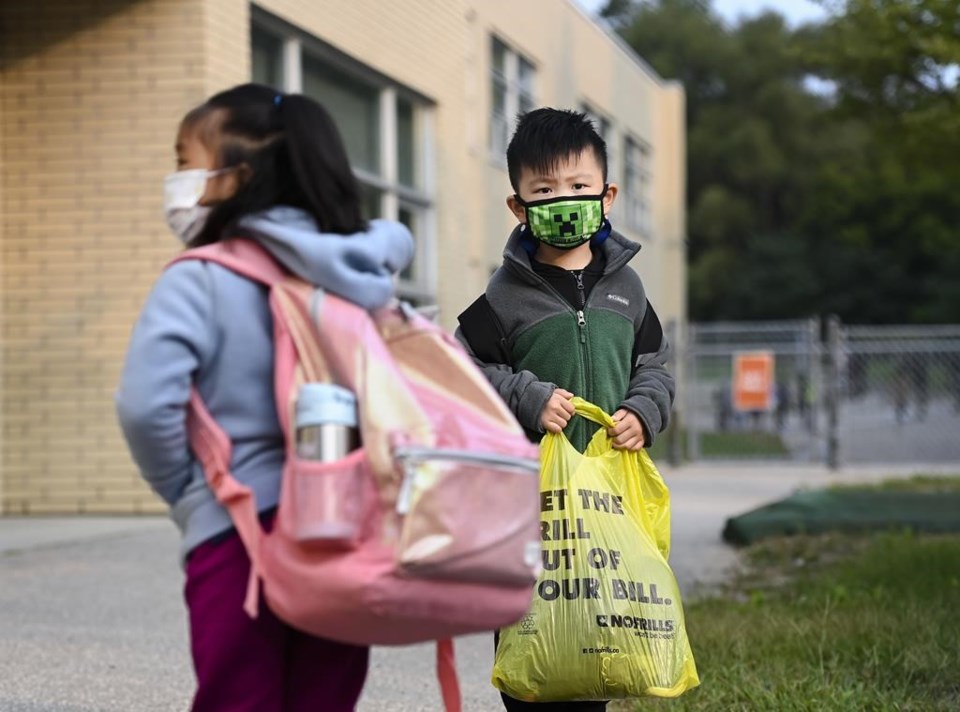Two of Ontario's major teachers' unions voiced concerns Thursday about the province's decision to scrap its mandatory isolation period for COVID-19 days before thousands of students and educators return to school in person.
The Elementary Teachers' Federation of Ontario and the Ontario Secondary School Teachers' Federation said they're worried allowing children and educators to return to the classroom while still potentially contagious could cause the virus to spread faster in schools.
They said that could put people's health at risk, and likely cause further disruptions to learning.
"We're going to have students together in a class that is not necessarily lots of space ... we're going to have kids in the cafeteria eating together," said Karen Littlewood, OSSTF's president.
"And without the need to stay off or to isolate, it's not a question of if we're going to have an eighth or ninth wave, but when and how soon it will happen with everybody being in school."
A spokesperson for Education Minister Stephen Lecce declined to comment Thursday, saying the province's top doctor had addressed those issues a day earlier.
Dr. Kieran Moore announced Wednesday that people who test positive for COVID-19 no longer have to isolate for five days, but can return to work or school once their fever is gone and their other symptoms have been improving for at least 24 hours.
He said people should then wear a mask in all settings for 10 days after the onset of their symptoms, and stay away from high-risk environments such as long-term care homes during that time.
The doctor pointed to improvements such as better ventilation and environmental cleaning in schools, as well as more handwashing and immunization, saying those mean the province can now have a "more permissive approach."
Schools across the province will start a new school year next week without COVID-19 restrictions for the first time since the pandemic began.
Canada's largest school board said Thursday it will continue to take its lead from public health officials and the provincial government on health and safety measures.
"Students and staff should continue to do a daily self-assessment before entering school or Board buildings and stay home if they are sick as per the revised screening tool provided by the Government of Ontario," said Ryan Bird, a spokesperson for the Toronto District School Board, said in a statement.
David Mastin, ETFO's first vice-president, said the union is worried the change in guidance will lead to more of "the same kind of chaos" schools have endured over the last two years.
"This is a government that for the last month has been claiming to be fighting for a stable and uninterrupted return to school... and then they go and do things that could also lead to a very unstable and a very interrupted... return for students in the fall," he said.
Both he and Littlewood questioned the level of improvement to ventilation in schools, saying HEPA filters have not been installed as widely as they should.
They also said the government is offloading responsibility onto workers by forcing them to decide when they can return to work.
Unions outside of the education sector also expressed concern about the change Thursday.
Lana Payne, Unifor's national president, said telling people to go back to work while still sick "contravenes common sense" and could lead to greater spread of the virus in workplaces, particularly warehouses, manufacturing and other congregate settings.
"Even if a worker has paid sick days, which many don’t, how do they tell their employer that they are using a sick day when the (chief) medical officer of health says they can work?" she said in a statement.
"The entire burden of the disease cannot rest on the shoulders of workers and the health-care system."
Ontario currently offers workers three days of paid sick leave for COVID-19-related absences such as testing, vaccination, isolation or caring for relatives who are ill with the virus. The government recently extended that program to the end of March 2023.
Dr. Gerald Evans, an infectious disease expert at Queen’s University, said telling people they can work as soon as they start to feel better as long as they wear a mask "puts everybody at risk" and will only exacerbate ongoing staffing shortages as workers – or their children – fall ill.
"I think this is a political view that if you just get everybody back at work, even if they're mildly sick with a mask on the economy will keep roaring," he said.
"This is a completely naive view of how economies run, because economies need people to be able to go to work. And this strategy is really a strategy to keep people out of work because we're going to have widespread infections," he said.
"This is not a way to handle the pandemic at this point."
- With files from Liam Casey
This report by The Canadian Press was first published Sept. 1, 2022.
Paola Loriggio, The Canadian Press



